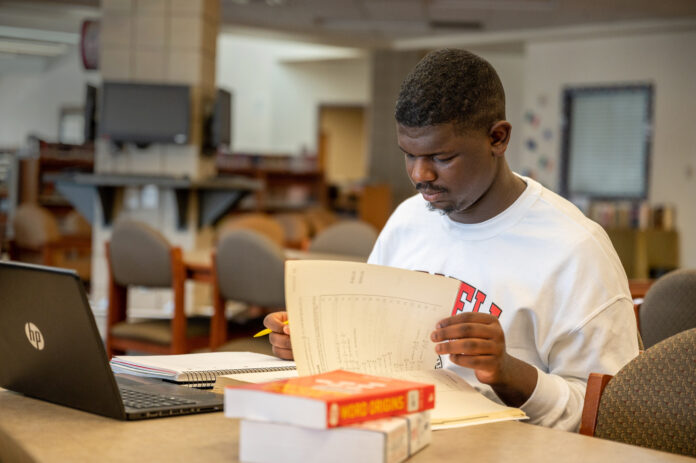
Tyler Brown’s first impression of Cornell University came in an Advanced Placement history class in Arkansas, courtesy of a teacher who required students to use Cornell Notes, a note-taking system created by an education professor there in the 1950s.
That impression was negative for Tyler who, like many other students, found the notes technique time-consuming and burdensome. But that would change soon enough.
Tyler, 18, now a student at Maricopa High School, is in the final months of his senior year and preparing to graduate in May. He moved to Maricopa from Paragould, Arkansas, in July to get a fresh start in a new city and re-focus on his studies before his dream of attending a competitive college went up in smoke.
A young Black man, Tyler was ready to leave behind the racial slurs he heard in the hallways of his Paragould school for new opportunity in Maricopa. He also left behind a family he loved so much it was interfering with his school life.
It was an uncommon and brave decision for an uncommon and brave student.
Tyler is “eccentric” and “a unique mix of humility, ambition, resilience and determination,” according to one of his MHS counselors. One of his teachers calls him “one of a kind.”
At a very young age while growing up in California, he developed an interest in geography and maps. Traveling the interstate often with his family, he became curious about interchanges and places along the highway.
By age 8, he had memorized the interstates, and a year later memorized where they led. Soon after, he could map the way to his grandma’s house and tell you what each city was famous for. Before he turned 12, he could reconstruct by memory a map of all the major freeways in the state.
And though he stood out a bit on his arrival at Maricopa High — “one of the first things kids noticed about me was my accent … it was the big talk,” he said — Tyler quickly settled in, making friends immediately and enjoying school lunches that were much better than he was used to.
“July 7 was one of the best days of my entire life,” he said of the day he arrived in Maricopa, “starting someplace new where I could finally hit the reset button.”
He found MHS staff and administration very welcoming. In fact, as soon as he arrived for the first day of school, they immediately sat him down, identified coursework to challenge him and began talking about applying to colleges.
But first there was the not so insignificant matter of rebuilding his academic confidence.
‘I couldn’t keep up’
For Bernadette Russoniello, a career and college coordinator at MHS, Job One was to help her new student get back on track and conquer his self-doubt about attending a competitive college.
“I met Tyler his first day at MHS and he made an impression within moments,” she said. “Tyler is a unique mix of humility, ambition, resilience and determination. We have worked together closely this past school year and he consistently seeks out advice, resources and support.”
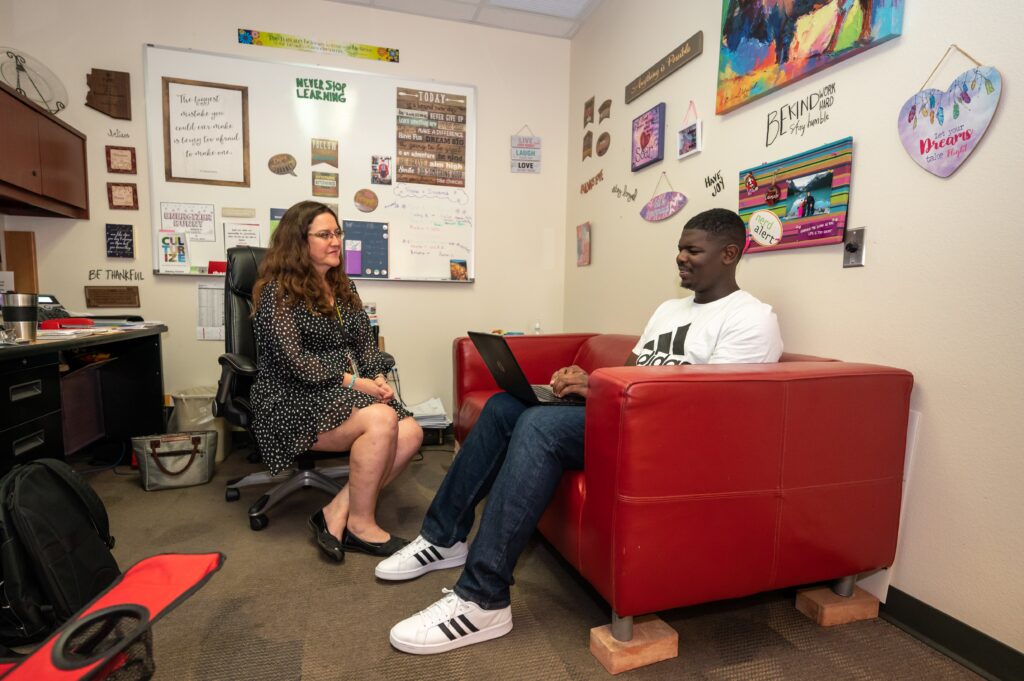
At the same time, his mother became ill, and Tyler took on greater responsibility at home, helping to care for two younger siblings, including one with special needs. Moreover, he was holding down an afterschool job at Walmart, where he often worked until 10 p.m. before returning home to make sure his siblings had completed their homework.
By the time he could sit down and think about his own schoolwork, it was often midnight or later. Some nights he was too tired and just went to bed, trying to make sure he could get some sleep before waking up at 5 a.m. to begin helping again with his large family’s morning routine.
He got behind and, uncharacteristically, began to perform poorly on tests.
“It got to the point where I couldn’t keep up,” Tyler said. “I had to choose between sleep and good grades. I chose sleep because if I can’t stay awake, I can’t help out.”
He eventually reached out to his teachers to explain the challenging circumstances at home but found their understanding underwhelming. That reality, combined with the racial slurs directed at him in the hallways, was making his life difficult.
His mother would apologize to him about the situation — she withheld specifics of her illness trying to minimize the distraction — but Tyler kept on even as his academic and career dreams became imperiled. It eventually became too much.
“Going through that took a toll mentally, physically and emotionally,” he admitted. “I just couldn’t keep up with it, so that’s when my mom made the difficult decision about (me) going to Maricopa.”
In May 2021, Tyler’s grandparents, Rose King and Paul Turner, moved to Maricopa after living with Tyler and his family in Arkansas. The couple had considered a move to Texas but the winter storm last February and the threat of tornados — 44 in the first four months of 2021 alone — led the couple to look west. Searching for a medium-sized area that wasn’t hard to get around in, and had the necessary amenities, led them to Maricopa.
Tyler followed two months later.
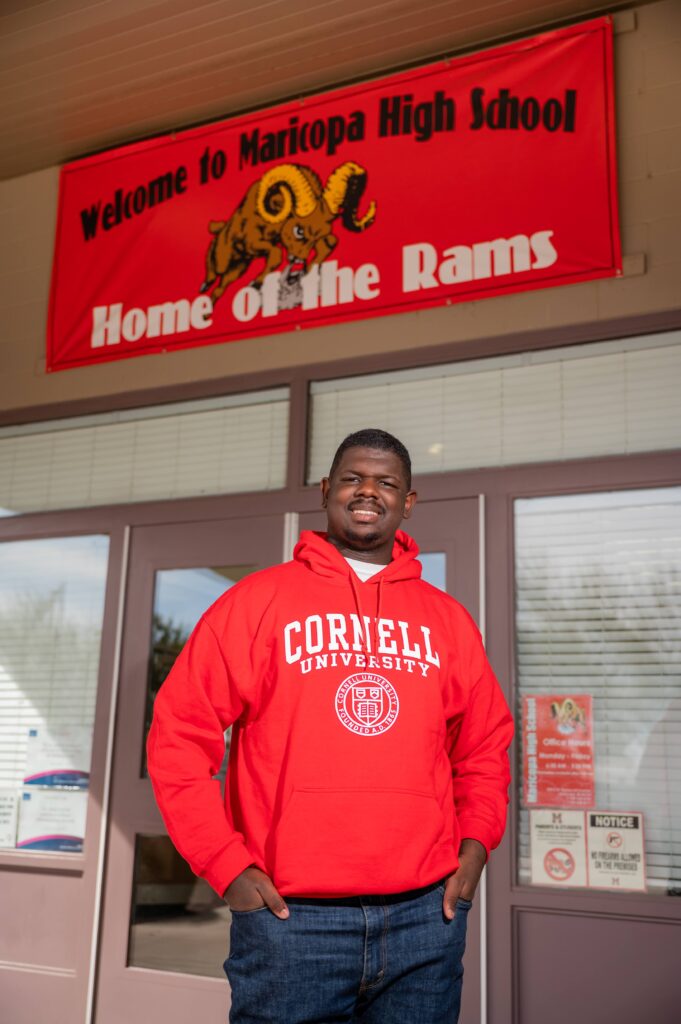
“As a senior (at MHS), I felt like I had to start from scratch,” Tyler said.
One day, he was surprised to see his name on a “Hopes and Dreams” list of students applying to competitive colleges and universities that Russoniello kept on her wall. He told her he didn’t think he compared to the other students on the list.
“Most of these students are ranked Top 10 (in the school) and then there is me, who is nowhere near those students,” he said, his humility on display. “So, it took much convincing. Especially as an African American student, it’s not expected for kids like me to go to such a college or even attempt to.”
By then, Cornell University had made a second impression on the senior (who had long dreamed of attending Stanford). The highly selective institution in the city of Ithaca in the Finger Lakes region of Central New York had sent him information about its Urban and Regional Planning program, the collegiate course of study he hoped to pursue.
He liked what he saw. It was squarely in his wheelhouse, and he took quick notice of a club for Blacks, Indigenous and people of color within the College of Architecture, Art and Planning.
“That’s what drew me to Cornell,” he said.
Tyler also was attracted to one of the founding principles espoused by Ezra Cornell during the official dedication of the university in 1868: “I would found an institution where any person can find instruction in any study.”
The concept of “… any person” meant that people from all walks of life, all income levels, races, religions and genders could attend the university. Similarly, “… any study” underscored the freedom to pursue academic interests wherever they lead.
That guiding philosophy, which continues today, would allow Tyler to explore wherever his studies led. That appealed to him.
But Tyler wondered if he really had a chance to be accepted, especially since he didn’t have the “best grades” coming off his junior year. After all, this was an Ivy League institution that admitted just 8.7% of 67,380 applications in 2021. And just 3% of its students annually hail from the Southwest.
But Russoniello and others, including English teacher Kathryn Noga, had taken stock of their new student. They could see the Honor Roll student’s grades rebounding, even as he became a student ambassador for the senior class and participated in Student Council.
They persuaded him to take a shot, and in late October he sent off an application to Cornell.
‘An investment worth making’
The application included letters of reference from Noga and Russoniello.
“If there were one word to describe Tyler Brown, it would be resilient,” Noga wrote to the Recommendation Committee. “Regardless of anything life has thrown in his way, Tyler has strived for success and excellence, but most importantly to leave the world a better place.”
“As a young Black man, Tyler is well aware of the current and critical conversations occurring on race in our nation,” she added, describing the first essay he wrote for her class. “In a heartbreaking page of prose, he divulged some of the pain and struggle he carries with him just because of his race. The racism he experienced alone is harrowing, but instead of focusing on that, Tyler continually chooses to rise above circumstance.”
Tyler was a unique opportunity for the college, Noga told the committee.
“In my time as a teacher, I would argue that there have been very few students, if any, who have been as bold enough to take risks, as resilient enough to rise above circumstance, as persevering enough to keep trying, and as compassionate enough to still desire to give back and make sure the work he commits his life to is for the benefit of others as Tyler Brown,” she ended her letter. “He is truly one of a kind. He is an investment worth making because he will be a role model for future generations; I am confident in that.”
Russoniello wanted the admissions folks to know that Tyler was a special student — and person.
“Tyler is eccentric; he sets daily learning goals and benchmarks, spending time each day reflecting on his strengths and deficits,” she wrote. “He defies stereotypes, striving to exceed and refusing to be pulled down by peers or social expectations. He possesses an intense drive to improve and better himself. He is charming, articulate and genuine; a natural storyteller and a great listener. Above all, he is resilient, embracing challenges and always growing.”
Tyler is the type of student who wants to belong and be involved, she noted.
“For our first assembly, he took the spirit stick (a tradition given to the most spirited class) out of my office and took it home for a makeover,” she related. “He returned it ablaze in ribbons and bling in our school colors. He sought out our Student Council sponsor and asked to participate in the assembly; at Homecoming he was sprinting along the bleachers with our giant spirit flag, waving the banner and cheering on his team with more pride and energy than students who’ve resided here their whole lives.
“Tyler is an incredible young man, a force of drive, academics and spirit that is refreshing,” she concluded.
Still, on the mid-December day Cornell announced its early acceptances, he figured his chances were slim. Russoniello had invited Tyler over for a pasta dinner and though he felt like he was putting her out, she insisted and he eventually acquiesced.
They ate before news of the decisions was posted online at 5 p.m. Figuring the server would be “blowing up” with less-patient applicants, Tyler waited 15 minutes before opening his laptop to find out what the Cornell admissions office thought of him.
When he logged in, a video slowly opened.
“It took me a good couple seconds to understand what it was saying. I saw the word ‘Congratulations’ on there, but it took me a second to grasp what was happening. And then I was like, ‘Oh my God, I got in! There’s no way I got in.’ To this day, I still think that decision was kind of fake.”
“I was so happy and tearful and overjoyed,” he added. “After all these years of struggling, and the past few weeks of constant worry (about his chances), it was a relief.”
A future of ‘discovering things’
Her son’s early acceptance to Cornell, ranked the 14th best college in the country this year by U.S. News and World Report, impressed Shaneka Burton, who saw her difficult decision pay incredible dividends.
“Oh gosh, I was very, very excited,” she said.
“I’m impressed. … I always tell him to reach for the stars, that you can achieve anything you want to be,” said Burton. “He said this is what he wanted to be as a toddler, stuck to it and I couldn’t be even more proud of him than I am today.”
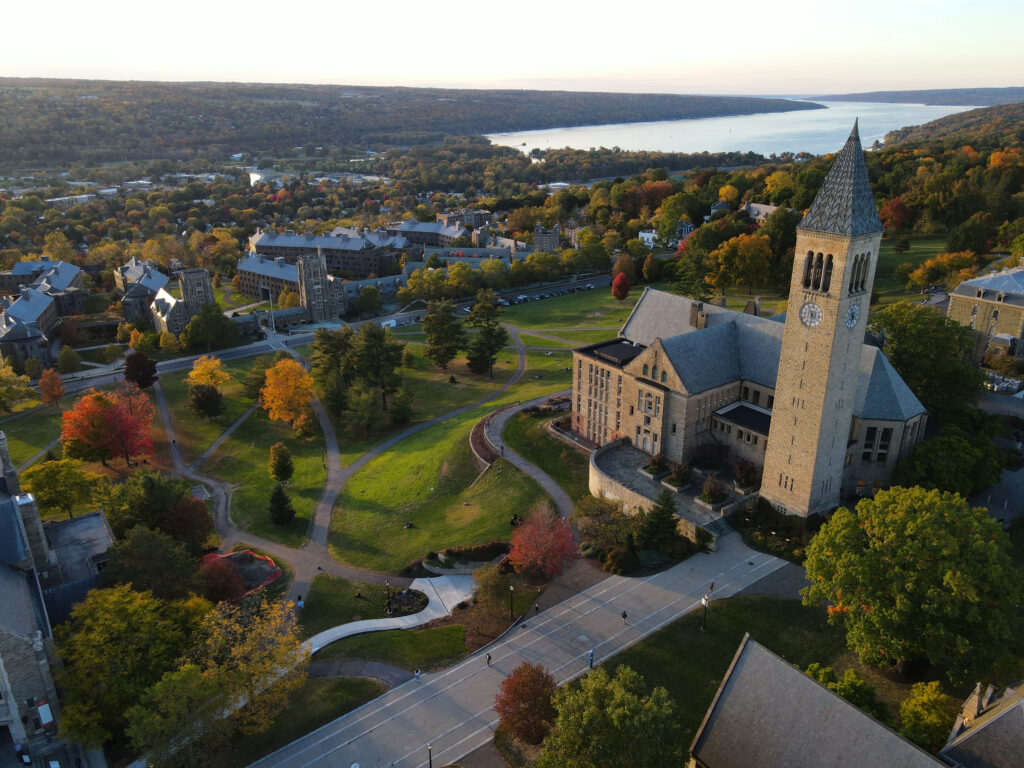
Tyler said his mother is his biggest inspiration. They’re in touch every day by phone or text, she said.
Always supportive, he remembers her telling him he could go to any college in the world, that he was that smart. “She was pushing me to be the best person I can be,” he said.
Burton, whose health is significantly better today, doesn’t see Tyler straying far from his core interests of geography and maps.
“In the years ahead, I see him discovering things,” she said. “He loves to discover things. He loves to map out things. My vision for him is to see him somewhere like NASA or Google or the National Geographic channel.”
She recalled that when the Yellow Pages phone book was delivered in their California neighborhood when Tyler was a boy, he would sit down and go over the maps.
But there is more to her son than infrastructure and topographical lines, Burton is quick to add.
“He’s smart and he’s intelligent, but he’s also very kind and helpful. He listens to people. He always wants to take on people’s problems and help solve them. He’s just a good person all around.”
Tyler has yet to visit the Cornell campus, with its irregular layout and eclectic architectural styles, but he will have lots of company when he heads there later this summer.
“That’s going to be a family trip,” said his mother.
This story was first published as the cover
story in the February edition of InMaricopa magazine.




![City gave new manager big low-interest home loan City Manager Ben Bitter speaks during a Chamber of Commerce event at Global Water Resources on April 11, 2024. Bitter discussed the current state of economic development in Maricopa, as well as hinting at lowering property tax rates again. [Monica D. Spencer]](https://www.inmaricopa.com/wp-content/uploads/2024/04/spencer-041124-ben-bitter-chamber-property-taxes-web-218x150.jpg)

![3 things to know about the new city budget Vice Mayor Amber Liermann and Councilmember Eric Goettl review parts of the city's 2024 operational budget with Mayor Nancy Smith on April 24, 2024. [Monica D. Spencer]](https://www.inmaricopa.com/wp-content/uploads/2024/04/spencer-042424-preliminary-budget-meeting-web-218x150.jpg)
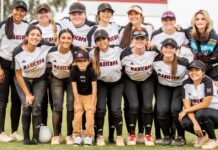




![Alleged car thief released without charges Phoenix police stop a stolen vehicle on April 20, 2024. [Facebook]](https://www.inmaricopa.com/wp-content/uploads/2024/04/IMG_5040-218x150.jpg)




![City gave new manager big low-interest home loan City Manager Ben Bitter speaks during a Chamber of Commerce event at Global Water Resources on April 11, 2024. Bitter discussed the current state of economic development in Maricopa, as well as hinting at lowering property tax rates again. [Monica D. Spencer]](https://www.inmaricopa.com/wp-content/uploads/2024/04/spencer-041124-ben-bitter-chamber-property-taxes-web-100x70.jpg)